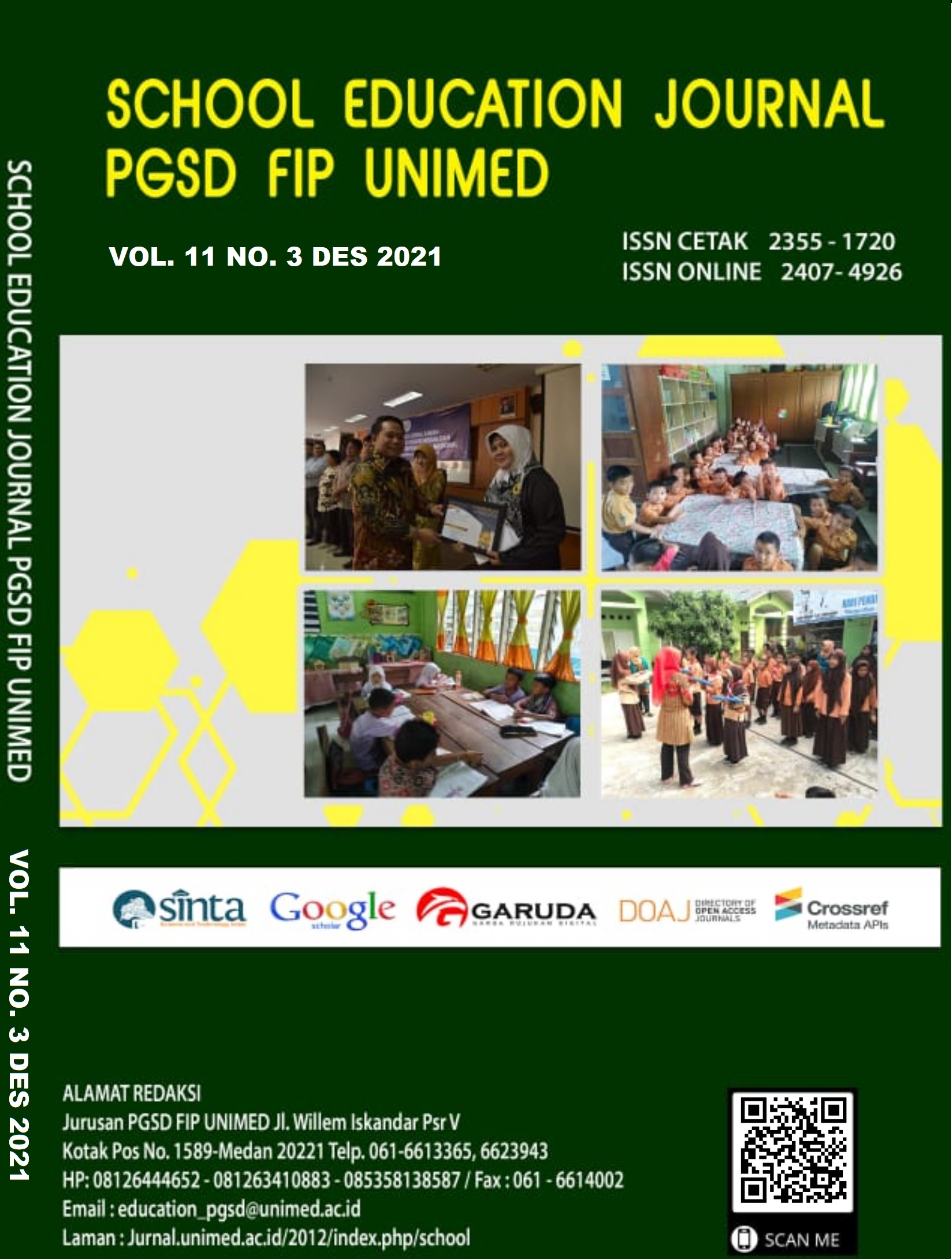PEMANFAATAN E-MODUL BERBANTUAN VIRTUAL LABORATORY DALAM PEMBELAJARAN IPA MAHASISWA CALON GURU SEKOLAH DASAR DI MASA PANDEMI COVID-19
DOI:
https://doi.org/10.24114/sejpgsd.v11i3.28594Keywords:
E-Module, Virtual Laboratory, Science Learning, Prospective Elementary School Teacher StudentsAbstract
The purpose of this study was to analyze the effectiveness of using virtual laboratory-assisted E-modules in science learning for prospective elementary school teacher students during the Covid-19 pandemic. This research method is an experiment with a quasi-experimental design. The subjects of this study were students of the PGSD study program FKIP UPY which consisted of two classes, namely class A5-20 as the experimental group and class A6-20 as the control group. The data collection instrument used a test question sheet consisting of pre-test and post-test question sheets. Data analysis technique using t-test and Normalized Gain (N-Gain). The results showed that there was a significant difference in science learning achievement between experimental group students and control group students as indicated by the value of t count = 2,799 > t table = 1,988 and (p) count = 0 < 0.05. Meanwhile, based on the results of the N-Gain test, it is known that the increase in science learning achievement in the experimental group obtained an N-Gain of 0.73 which is in the high category and in the control group an N-Gain of 0.52 is obtained which is in the medium category. Based on these results, it can be concluded that the use of e-modules assisted by virtual laboratories is effectively used in science learning for prospective elementary school teacher students during the COVID-19 pandemic.References
Asrial, S., Kurniawan, D. A., Chan, F., Septianingsih, R., & Perdana, R. (2019). Multimedia innovation 4.0 in education: E-modul ethnoconstructivism. Universal Journal of Educational Research, 7(10), 2098-2107.
Cahyani, A. E. M., Mayasari, T., & Sasono, M. (2020). Efektivitas E-Modul Project Based Learning Berintegrasi STEM Terhadap Kreativitas Siswa SMK. Jurnal Ilmiah Pendidikan Fisika, 4(1), 15-22.
Dewa, E., Mukin, M. U. J., & Pandango, O. (2020). Pengaruh pembelajaran daring berbantuan laboratorium virtual terhadap minat dan hasil belajar kognitif fisika. JARTIKA Jurnal Riset Teknologi Dan Inovasi Pendidikan, 3(2), 351-359.
Diliana, W. O., & Sutrisno, B. (2019). Penggunaan Media Pembelajaran E-Modul Dalam Internalisasi Soft Skill Pada Mata Pelajaran Akuntansi Di Smk Muhammadiyah Delanggu (Doctoral dissertation, Universitas Muhammadiyah Surakarta).
Ekaputra, F. (2020). Efektivitas Laboratorium Virtual Kimia Berbasis Hypertext Markup Language 5 Untuk Meningkatkan Sikap Ilmiah Dan Prestasi Belajar. Tarbawy: Jurnal Pendidikan Islam, 7(1), 6-16.
Herliandry, L. D., Nurhasanah, N., Suban, M. E., & Kuswanto, H. (2020). Pembelajaran pada masa pandemi Covid-19. JTP-Jurnal Teknologi Pendidikan, 22(1), 65-70.
Hikmah, N., Saridewi, N., & Agung, S. (2017). Penerapan laboratorium virtual untuk meningkatkan pemahaman konsep siswa. EduChemia (Jurnal Kimia dan Pendidikan), 2(2), 186-195.
Laili, I. (2019). Efektivitas Pengembangan E-Modul Project Based Learning Pada Mata Pelajaran Instalasi Motor Listrik. Jurnal Imiah Pendidikan Dan Pembelajaran, 3(3), 306-315.
Lestari, H. D., & Parmiti, D. P. P. P. (2020). Pengembangan e-modul IPA bermuatan tes online untuk meningkatkan hasil belajar. Journal of Education Technology, 4(1), 73-79.
Lestari, H. D., & Parmiti, D. P. P. P. (2020). Pengembangan e-modul IPA bermuatan tes online untuk meningkatkan hasil belajar. Journal of Education Technology, 4(1), 73-79.
Mustakim, M. (2020). Efektivitas pembelajaran daring menggunakan media online selama pandemi Covid-19 pada mata pelajaran matematika. Al asma: Journal of Islamic Education, 2(1), 1-12.
Muzijah, R., Wati, M., & Mahtari, S. (2020). Pengembangan e-modul menggunakan aplikasi Exe-Learning untuk melatih literasi sains. Jurnal Ilmiah Pendidikan Fisika, 4(2), 89-98.
Nirmala, W., & Darmawati, S. (2021). The Effectiveness of Discovery-Based Virtual Laboratory Learning to Improve Student Science Process Skills. Journal of Education Technology, 5(1), 103-112.
Nisa, H. A., Mujib, M., & Putra, R. W. Y. (2020). Efektivitas E-Modul dengan Flip Pdf Professional Berbasis Gamifikasi Terhadap Siswa SMP. Jurnal Pendidikan Matematika Raflesia, 5(2), 13-25.
Priyonggo, H. W., Wardono, W., & Asih, T. S. N. (2021). Mathematics Literacy Skill on Problem Based Learning Assisted by E-Module Agito Based on Learning Motivation. Unnes Journal of Mathematics Education Research, 10(A), 54-58.
Santika, A., & Sylvia, I. (2021). Efektivitas E-Modul Berbasis Anyflip untuk Meningkatkan Kemampuan Penguasaan Materi Peserta Didik pada Materi Nilai dan Norma Sosial Kelas X di SMA N 3 Payakumbuh. Jurnal Sikola: Jurnal Kajian Pendidikan dan Pembelajaran, 2(4), 285-296.
Sari, P. I., Gunawan, G., & Harjono, A. (2017). Penggunaan discovery learning berbantuan laboratorium virtual pada penguasaan konsep fisika siswa. Jurnal Pendidikan Fisika dan Teknologi, 2(4), 176-182.
Satria, R. P., Sahidu, H., & Susilawati, S. (2020). Efektifitas Perangkat Pembelajaran Fisika Model Inkuiri Terbimbing Berbantuan Laboratorium Virtual untuk Meningkatkan Keterampilan Berpikir Kreatif Peserta Didik. Jurnal Penelitian dan Pembelajaran Fisika Indonesia, 2(2).
Sidiq, R. (2020). Pengembangan E-Modul Interaktif Berbasis Android pada Mata Kuliah Strategi Belajar Mengajar. Jurnal Pendidikan Sejarah, 9(1), 1-14.
Wahyuni, D., Sari, M., & Hurriyah, H. (2020). Efektifitas E-Modul Berbasis Problem Solving Terhadap Keterampilan Berfikir Kritis Perserta Didik. Natural Science: Jurnal Penelitian Bidang IPA dan Pendidikan IPA, 6(2), 180-189.
Wahyuni, S., Lesmono, A. D., & Fitriya, S. (2021). Pengembangan Petunjuk Praktikum Fisika Berbasis Laboratorium Virtual (Virtual Laboratory) pada Pembelajaran Fisika di SMP/MTs. Jurnal Pembelajaran Fisika, 1(3), 272-277.
Wahyuni, S., Lesmono, A. D., & Fitriya, S. (2021). Pengembangan Petunjuk Praktikum Fisika Berbasis Laboratorium Virtual (Virtual Laboratory) pada Pembelajaran Fisika di SMP/MTs. Jurnal Pembelajaran Fisika, 1(3), 272-277.
Downloads
Published
Issue
Section
License
Authors whose manuscripts are approved are approved as follows:
The publication rights for all journal manuscript materials published/published on the SEJ (School Education Journal) E-Journal site are held by the editorial board with the author's knowledge (moral rights remain with the manuscript authors).
The formal legal requirements for accessing this electronic digital journal article are subject to the terms of the Creative Commons Attribution-ShareAlike (CC BY) license, which means that E-Journal SEJ (School Education Journal) has the right to store, transfer media/format, manage in the form of a database, maintain, and publish articles without asking permission from the author as long as the author's name remains as the copyright owner.
Manuscripts published/published electronically are open access for educational, research, and library purposes.

